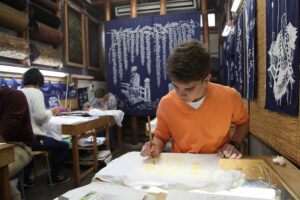MBA Students are Pushed Out of Their Comfort Zones by Encouraging Experimental Learning
Practical learning is replacing the old-fashioned way of teaching in Business Schools
Recently, there is different trend throughout business schools. Courses have placed a greater focus on experiential projects, believing that people learn effectively by doing. It has been widely acknowledged that the case study approach of teaching was the most successful throughout the world in the past, with students evaluating real-world company difficulties and obstacles. This was regarded as a conventional method of instruction at the heart of MBA programs at business institutions.
Ewa Maciejewski, director of strategic initiatives, corporate partnerships, and careers at the University of St Gallen in Switzerland, proposed boosting experiential learning in their MBA programs. “There has been a considerable expand in experiential learning in our MBA program over the last many years”, she continues. “Our objective is to encourage students to come out of their shells and experience something they haven’t experienced before.”
Furthermore, she went on to say, “It is normal to encounter MBA participants with prior experience. They intend to build on that by broadening their skills, rather than relying on textbooks and traditional teaching techniques. MBA students seek and emphasize hands-on, real-life business cases with their core centered in a local business environment.”
According to Stefanos Zarkos, associate dean of academic programs at Alba Graduate Business School in Athens, Greece, students are clearly interested in the relationship between theory and business practice. They are constantly looking for new methods to use information to help them gain useful abilities that they can apply in real life.
“Our students have given us great feedback on the immersive courses we offer,” Zarkos remarked. “Not only is it confined to genuine case studies, but it may also incorporate other methods of education, such as open talks with industry professionals and informal means of learning like games and simulations.”
Michael Price Student Investment Fund, established in 2000 by NYU Stern School of Business in New York City, is an example of an early use of the experiential approach. It is a family of funds that was founded over two decades ago by MBA students.
Experiential learning has grown by more than 180 percent in the preceding four years, with 650 students taking such courses each year. Stern Solution, for example, comprises of projects in which students collaborate with a professor to address business problems for major corporations like as Amazon, Estee Lauder, and BMW.
With such fast changes in today’s business and society, Stern feels that experimenting is an important component of the MBA program and advises students to fail without fear because it is a fundamental and necessary part of their learning experience.
According to Bryan Ramos, NYU Stern’s assistant dean in the global education department, “We believe it is critical for students to have the ability to reform what they learn during the course, much like muscle memory.” He added “By learning and improving via the experiential learning cycle, they will have a strong foundation for improved future learning environments.”
Successful career after MBA is accompanied by an experiential learning
Cornuel, the executive director of the European Foundation for Management Development in Brussels, underlined the importance of teaching experiential learning. “Companies are moving further away from organizational structure and toward cross-functional connections of interlinked teams, all in an exceedingly unique context,”. He adds, “This change demands a deeper knowledge of the complexity governing organizational culture and information flow, which experiential learning significantly enhances.”
Georgetown MBA established the Global Business Experience consulting initiative as a method of experiential learning. This program was created about three decades ago with the school’s strong emphasis and attention on experiential learning.
Georgetown University’s McDonough School of Business in Washington, DC, has launched multiple experiential opportunities in recent years, including the Venture Fellowship Program, which positions students in a year-long apprenticeship with a local investment firm.
Another experiential opportunity can be found at the Real Estate Clinic, where students participate working on live real estate investments by cooperating with commercial real estate firms.
Prashant Malaviya, senior associate dean for the MBA program at Georgetown, suggested that experiential learning is what develops student’s ability to combine what they learnt in classroom into something else. “I believe experiential learning is equivalent to muscle memory. By achieving academic through experiential learning, it builds the core of instincts for students to collaborate their learnings skills into use to communicate and cooperate with fellow students as team. It emphasizes on the accomplishments and downfalls at the same time.”.
Why experiential learning is becoming fundamental for post-MBA careers
Experiential learning can also assist students gain marketability. Mr. Malaviya states that “The more students to take part in hands-on education, the better they are at exhibiting their abilities and talents to potential employer.”.
13 Global Client Projects were offered to its MBA and executive MBA students this year by the University of Virginia’s Darden School of Business. These are electives and opportunities that allow small groups of students to deliver consultancy services to a multinational firm.
“The situation is more complicated because those suggestions and actions will have a genuine impact for the stakeholders with whom the students are working with,” addressed by Katherine Beach, executive director of Darden’s Center for Global Initiatives.
“Moving to a collegiate environment during Covid has enable us to arrange projects with businesses and organizations in regions that would be impractical for students to attend in person,” she stated. Even though onshore visits were suspended last year and will be reduced this year due to Coronavirus, technology can help students to participate in intensive sessions from a distance.
Even with all the problems caused by Covid, the experiential teaching parts of the MBA have strengthened rather than weakened, according to Florian Kraus, academic director of the MBA at Germany’s Mannheim Business School.
He does, however, underline the pervasiveness of the traditional teaching through textbooks. “Experiential learning benefits are only effective if the various training aspects, such as lectures or case studies, are tightly integrated,” Kraus says. “Only in this fashion can MBA programs provide excellent and long-term success.”
Read More: UC’s highest number of Applicants due to Diverse Racial Groups



